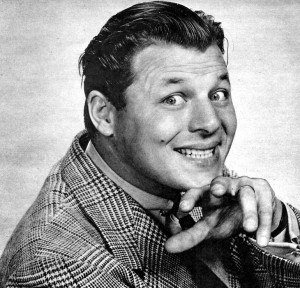“There’s something about the sound of my own voice that fascinates me…”
Sixty-nine years ago on this date, CBS premiered The Jack Carson Show: a half-hour situation comedy starring the comic actor famous at that time for such films as Love Crazy, The Male Animal and The Hard Way (with his frequent onscreen partner, Dennis Morgan). A series with strong echoes of both the Jack Benny and Bob Hope programs, Carson essentially played himself; a Hollywood celebrity living at 22 North Hollywood Lane in a residence staffed with the go-to character actor for butlers, Arthur Treacher, as his valet and second banana Dave Willock as his nephew “Tugwell.” Other supporting players on the show included Irene Ryan, Eddie Marr (as Jack’s agent), Agnes Moorehead, Elizabeth Patterson, child actress Norma Jean Nilsson…and the ubiquitous Mel Blanc.
Though he proudly embraced his Milwaukee, Wisconsin roots, John Elmer Carson was actually born in Carman, Manitoba in 1910 before his parents migrated to the town Carson would later help to make famous. His show business career began when he teamed up with the aforementioned Mr. Willock in a vaudeville act (Willock and Carson)—but with the decline of that form of stage entertainment in the mid-thirties, both men decided to try their luck in Hollywood, getting hired for bit parts at R-K-O in 1936. Both Willock and Carson were able to secure a lot of feature film work—but it was Jack who hit the “Jack-pot,” appearing in minor roles in film classics such as Stage Door, Bringing Up Baby and Destry Rides Again. Carson’s movie fortunes took an upswing when he was hired by Warner Brothers in the 1940s (thanks to his budding radio career), appearing in the likes of Arsenic and Old Lace, Roughly Speaking…and the film most consider his finest acting work, 1945’s Mildred Pierce (“I’m so smart it’s a disease!”).
Willock and Carson broke into radio with a celebrated appearance on Bing Crosby’s Kraft Music Hall in 1938, which led to the two of them being hired for the NBC West Coast series Signal Carnival in 1941, and the coast-to-coast Camel Comedy Caravan in 1943. The Comedy Caravan was a preview of how Carson’s self-titled program (sponsored by Campbell Soups) eventually developed; Jack played a brash ladies’ man (like Bob Hope) who was also a little stingy (like Jack Benny) beset by both butler “Treacher” and nephew “Tugwell,” not to mention other assorted friends and relatives. Carson’s show continued on CBS until 1947, when he jumped ship to NBC to become the male lead (alongside future school teacher Eve Arden) on The Sealtest Village Store…and then when that program folded after a season, he was back on CBS for another year (still hawking Sealtest), finally calling it a wrap in July 1949. Carson later did a five-day-a-week variety series that ran from October 3, 1955 to December 20, 1956.
One of the most memorable gags on The Jack Carson Show was the star’s doorbell, which combined “the features of a carnival wheel, an alarm clock, a fire alarm and a factory whistle,” according to OTR historian John Dunning.



Congrats on the blog, Ivan. My favorite Jack Carson role remains his work in Larceny Inc, as a bewilderingly fast-talking luggage wholesale rep with such lines as “comes in teal, seal, clabber, blabber, blubber, clubber, etc.”
Thanks for the congrats, Chris! I love that turn of Carson’s, too. That’s what I enjoyed so much about the man: even when he was playing fatheads like in Destry Rides Again or Cat On a Hot Tin Roof he managed to maintain a degree of likability.
Thanks for your excellent post filling in details that I had never known about the radio side of Jack Carson’s career.
He had a great speaking voice with such range that it isn’t surprising that he had some success in radio. I love his character of Wally in MILDRED PIERCE (1945), but when he was in really “straight” roles such as his touching characters in THE HARD WAY (1943) and THE TARNISHED ANGELS (1957) he was equally convincing and sympathetic–bringing to life the sorrows of guys who had small dreams and less luck without ignoring the element of self-pity within them.
Thanks for the comment, Moira! I’m a big fan of Carson’s radio show, and I confess that for many years that’s how I knew him best: the brash egomaniac who manages to be lovable in spite of himself. But it’s interesting that you mention The Hard Way…I got to see that a few years ago and I was really impressed with his performance in that movie; so heartbreakingly sympathetic (and much more likable than Dennis Morgan’s character, I thought). I confess that I always enjoyed him for the comic stuff (one of my favorites of his is the movie he made with Morgan and Doris Day, It’s a Great Feeling) but I’m glad people are starting to notice that he had impressive dramatic chops as well.